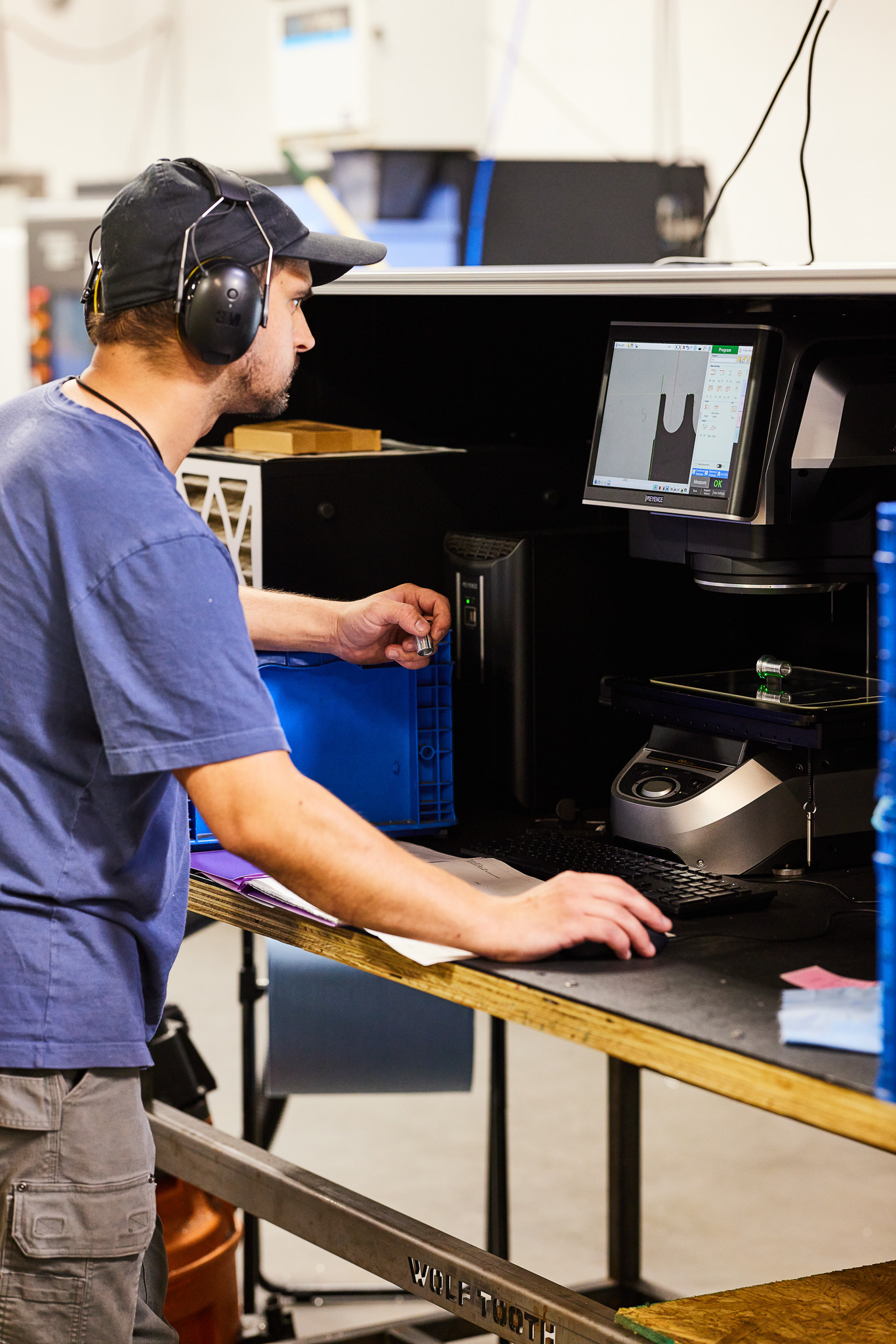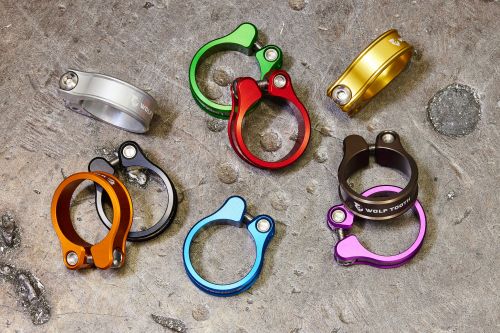A version of this article ran in the September issue of Bicycle Retailer & Industry News. If you are not receiving our magazine, please visit our subscription page.
MINNEAPOLIS (BRAIN) — Co-founder Brendan Moore characterizes Wolf Tooth Components as a product-first company. The brand's 2,000 selling SKUs — including about 500 chainring spec' variations alone — and 10 engineers among a staff of 87 full- and part-time employees certainly bear that out.
"There are a bunch of marketing-first companies out there," Moore said. "There are some good ones out there, where they just have somebody else make the stuff. That stuff's not that special, but they do an amazing job marketing. But we are not that."
With backgrounds in mechanical engineering in tech, Moore, along with fellow co-founders Dan Dittmer and Mike Pfeiffer, were cycling buddies who bonded over the need to create a narrow-wide chainring for fat bikes. Because of their backgrounds, they had manufacturing, design, and production connections to start their side gig in 2013 selling chainrings on the MTBR forum and then direct to consumer later that year when demand grew.
"There wasn't even a web store yet," Moore said.
Now there is — and a lot more, including components like pedals, headsets, dropper posts and levers, tools, and myriad small parts like chainring bolts, spacers, and tubeless valve stems. They even have their own bike line, Otso Cycles, which started in 2016.
"After six to nine months, it was like, 'This could actually be a job,'" Moore said. "We worked two jobs for a year and a half and two years between the three of us. We were still working our tech jobs and doing this in the morning, at lunch, and at night, so that we could reinvest everything into the company, every penny. We didn't take home a penny to build the company up in a very fiscally responsible way, just reinvesting. Then we jumped ship, left Big Brother — left the golden handcuffs, as they say — all three of us, which was pretty scary."
Made in Minneapolis
They landed on solid ground, designing and assembling all products in Wolf Tooth's 30,000-square-foot facility that it owns — "and we're packed to the gills," Moore noted. About 80% of its products are manufactured there with 17 CNC machines running on three shifts and another six or seven CNCs operating at an off-site machine shop it partners with on the north side of the Twin Cities. Some parts are sourced from overseas and elsewhere, but Moore said they make as much as possible in Minneapolis.
Additionally, Wolf Tooth works with U.S. molders and other domestic partners like Enduro Bearings.
"What's made overseas, things like dropper posts, is all brought here for assembly," said Moore, who added some of the brand's 6061 and 7075 aluminum is imported from China, which has become more expensive because of recent tariff increases. "And we had to do that because we couldn't actually find a manufacturer to do the three main parts of that in the U.S., that could do it in our volumes. When we're ordering thousands of parts at a time, these vendors say, 'You're not going to order a million?' There are some people who don't like to hear this, but there are some things that really can't be made in the U.S. in a lower scale like we have. It's just how it is. If we have a great idea or a great design, we're not going to not do a product just because we can't make every part here. We're going to make every part here that's feasible to make."
Wolf Tooth ships roughly 50,000 component units a month, from a bolt to a dropper post.
"I have a lot of different roles, or, I guess, things that report to me here," Moore said. "Three of them are supply chain, shipping, and assembly. I was looking at those numbers just recently, looking at how we scale, and it's daunting, so you have to really step back and look at the things you can do, rather than worrying about the things that you can't."
Bike brand expands
One of those on the to-do list is finding a bigger facility or at least additional storage, especially with Wolf Tooth expanding its Otso Cycles models. Initially, Otso Cycles began with a fat bike and gravel model. It expanded into hardtail mountain and bikepacking models. Frames are constructed in steel. titanium, and carbon fiber and manufactured in Taiwan. Wolf Tooth also created a separate component brand, Lithic, a sub-brand of Otso Cycles. Its products, handlebars, rims, and carbon forks, are made overseas but designed in Minneapolis.
Otso's first gravel bike launched in 2016 and featured a frame designed to fit tires as wide as 2.1 and a fork that could clear up to a 29x2.1 wheel and maintain a 420mm axle-to-crown dimension.
"We had tire clearance three years before it became the norm," Moore said. "Early gravel racing was in our area, and so we had experience in it. You can take a cyclocross bike on gravel, but it's not really that great for it. You can do it on a mountain bike, but it's not really that great for it. These are the things that would make that experience better."
What Otso experienced during the pandemic and what followed is not unique in the industry, but it is especially challenging for a small bike brand.
"The discounting of the brands that are in trouble, which I won't name, it stinks," Moore said. "We just had a steel bike launch. It's a beautiful bike, rides really well, has a really cool design with features like a tuning chip. When it went to market, we had a dealer call us and say there's this other company discounting their Rival AXS bike by 50%. That's the same price as your GRX bike. And we're like, we don't play that discount game. That company selling that 50% off bike off is losing money, quite a lot of money. So that's the least fun about this. The bike side is just taking a long time. I'm hearing like next summer before it really kind of works its way out. That really means 2026 is the first potentially normal year."
Moore said the pandemic rush and post-pandemic crash has not affected the Wolf Tooth side as much because manufacturing mainly domestically allows for more volume control.
"The bigger challenge on the Wolf Tooth side was bigger customers getting into issues, mainly distributors, but to some extent dealers, where they got overstocked, but mostly not on our stuff. They're changing their buying behavior because they know we have short lead times and small batches."
Moore said Wolf Tooth's OEM business is growing, mainly servicing boutique brands. "I think the MADE.Bike show is probably our staff's favorite show because that is our crew."
Omni-channel approach
In addition to direct-to-consumer, Wolf Tooth is available through a multitude of North American and international dealers, and about 80 dealers carry Otso Cycles, mostly in the U.S. "I always tell people, in today's day and age, you can't tell a customer how to buy," Moore said. "You have to let the customer tell you how they want to buy your stuff. And if you don't do that, you might not be around too long."
Call it anticipating the next big thing, which Wolf Tooth made a habit of in its early days by investing in the 1x mountain bike drivetrain, manufacturing 40- and 42-tooth Giant Cog options for Shimano and SRAM 10-speed cassettes. "We weren't thinking that this is going to live forever and that Shimano and SRAM were never going to make this," Moore said. "When we were selling a lot of those, we took all that money and reinvested it into new product design.
"In one sense, we were lucky and super happy that we got to benefit from that conversion in the industry. But we were always like, what do we have to have in two to three years? It's been a transformation to get people to not think about either a Road Link (derailleur hanger extension that is still available) or the Giant Cog when they think about Wolf Tooth. Hey, we make dropper posts and headsets and really cool multi-tools."
An important factor in the design process is to make components repairable, which is important to the three founders who believe in sustainability and are also attempting to reduce plastic in packing materials.
"We have a deep, personal passion for that because it differentiates our products — our droppers, our pedals, all those things — by being able to repair those. It's not free or cheap to design that way and offer all those replacement parts. If you had a Version 1 dropper post, and we just launched a Version 2, you can literally swap in the cartridge and have a Version 2. This is not just a business opportunity. This is something we care about."
Any talk with one of Wolf Tooth's founders wouldn't be complete without finally asking what's on the drawing board. Moore wouldn't provide specifics, other than to say, "We have five products coming in the next year — five significant product lines — I'll say that."




